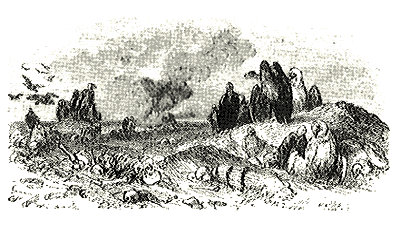The Prairies
The unshorn fields, boundless and beautiful,
For which the speech of England has no name--
The Prairies. I behold them for the first,
And my heart swells, while the dilated sight
Takes in the encircling vastness.
Among the high rank grass that sweeps his sides
The hollow beating of his footstep seems
A sacrilegious sound. I think of those
Upon whose rest he tramples. Are they here--
The dead of other days?--and did the dust
Of these fair solitudes once stir with life
And burn with passion? Let the mighty mounds
That overlook the rivers, or that rise
In the dim forest crowded with old oaks,
Answer. A race, that long has passed away,
Built them;--a disciplined and populous race
Heaped, with long toil, the earth, while yet the Greek
Was hewing the Pentelicus to forms
Of symmetry, and rearing on its rock
The glittering Parthenon. These ample fields
Nourished their harvests, here their herds were fed,
When haply by their stalls the bison lowed,
And bowed his maned shoulder to the yoke.
All day this desert murmured with their toils,
Till twilight blushed, and lovers walked, and wooed
In a forgotten language, and old tunes,
From instruments of unremembered form,
Gave the soft winds a voice. The red man came--
The roaming hunter tribes, warlike and fierce,
And the mound-builders vanished from the earth.
The solitude of centuries untold
Has settled where they dwelt. The prairie-wolf
Hunts in their meadows, and his fresh-dug den
Yawns by my path. The gopher mines the ground
Where stood their swarming cities. All is gone--
All--save the piles of earth that hold their bones--
The platforms where they worshipped unknown gods--
The barriers which they builded from the soil
To keep the foe at bay--till o'er the walls
The wild beleaguerers broke, and, one by one,
The strongholds of the plain were forced, and heaped
With corpses. The brown vultures of the wood
Flocked to those vast uncovered sepulchres,
And sat, unscared and silent, at their feast.
Haply some solitary fugitive,
Lurking in marsh and forest, till the sense
Of desolation and of fear became
Bitterer than death, yielded himself to die.
Man's better nature triumphed then. Kind words
Welcomed and soothed him; the rude conquerors
Seated the captive with their chiefs; he chose
A bride among their maidens, and at length
Seemed to forget--yet ne'er forgot--the wife
Of his first love, and her sweet little ones,
Butchered, amid their shrieks, with all his race.
Bryant wrote another poem, Thanatopsis, along the same lines. The person who transcribed these poems offers an analysis:
Perhaps a romantic poet could have picked up that truth and colored it with the literary shades of pleasurable remorse, but the effect worked better upon the reader if the living Indian tribes could be ignored and hazy images of noble civilizations, who "heaped, with long toil, the earth, while yet the Greek was ... rearing on its rock the glittering Parthenon" presented in their stead.
For more on the subject, see Indian Mounds in P. Allen Smith Gardens and Lamenting Indians = Letting Indians Die.
Below: "The brown vultures of the wood flocked to those vast uncovered sepulchres" (illustration for "The Prairies" from Poems, 1876 edition).


No comments:
Post a Comment
Note: Only a member of this blog may post a comment.